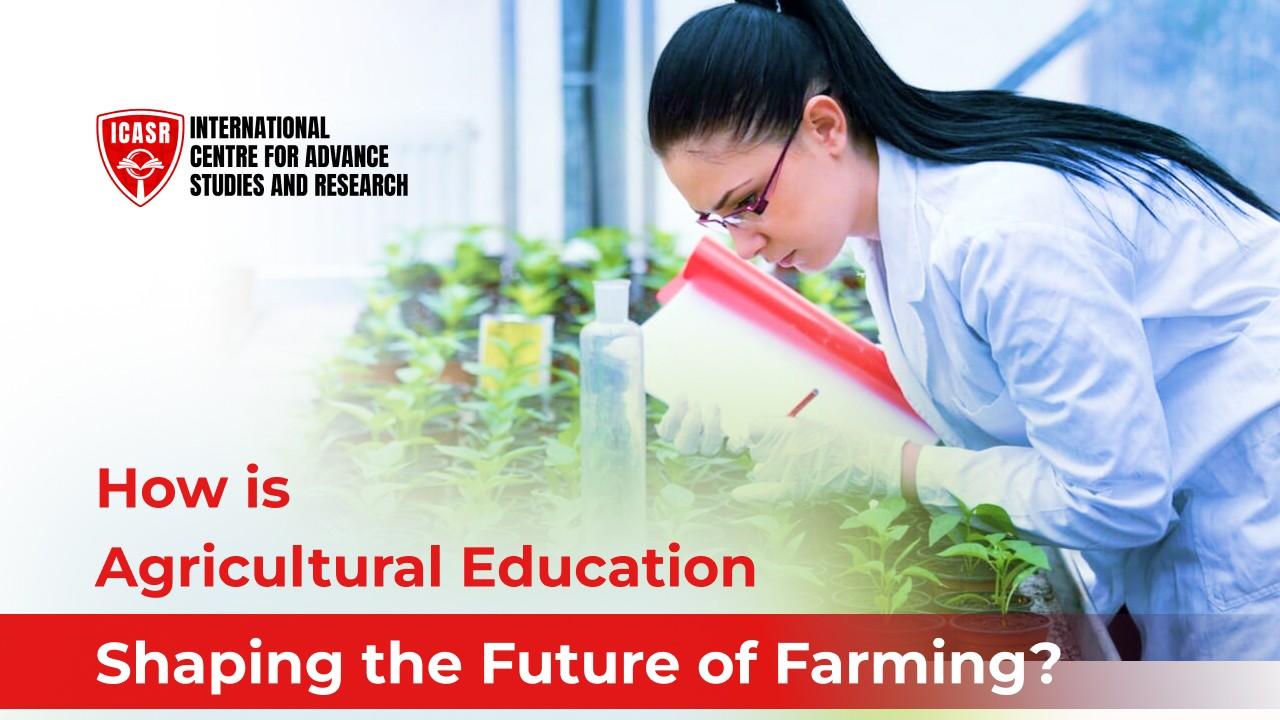
There is no contesting that agriculture has sustained mankind since they began tilling lands for food supply. Farming goes way back to the era when humankind learned to domesticate plants and animals. It has been the catalyst for change, wherefrom societies began to evolve and become cultured.
A reliable food supply evidently keeps the world going. Agriculture gave birth to cities and civilizations and sustained the world, and today the global population has rocketed to 8.1 billion. Over the decades and years, farming has witnessed massive evolution driven by scientific research, changing demands and technological advancements. Farming today is characterised by the integration of scientific methods like improved seeds and irrigation systems, machinery, precision agriculture techniques, etc. These initiatives are employed to optimize efficiency and productivity and mitigate environmental threats.
In this blog today, let us discuss the intrinsic roles that agricultural education plays in shaping the future of farming. We shall delve into the impact of agricultural education on farming practices across the globe and how it will enable the world with a more sustainable farming and quality of living in the face of environmental crisis.
The Key Player: Agricultural Education Shaping the Future
Today, aside from just food supply, agriculture is key to the growth of an economy. From creating job opportunities to raising income to reducing poverty, the roles of agriculture are evidently critical. The transformation of this key player has been and will continue to be pre-eminent for every nation's progression through different phases, for instance, from agriculture to industrialization to now industry 4.0/ 4IR. This transformation is attainable only through scientific support via education.
According to the World Bank, the world's population is going to shoot up to 10 billion by 2050. A critical question here is, how will agriculture continue to feed the world without causing irreparable strain on the available resources? The bisection of the world's habitable land is utilized for agriculture. This extensive use of land for agriculture is also causing negative impacts on the environment, such as threats to biodiversity, and shrinking of wild areas, etc. So, how will farmers tackle these complex processes of agroecology? How do we incite new agriculture policies? How do we help farmers integrate new practices and scientific methods? This is where agricultural education becomes critical.
Let us address these critical questions by exploring the indispensable roles of agricultural education in farming and empowering farmers with agribusiness skills, besides fostering sustainable development and future of agriculture.
Agricultural Education: A singular method for empowering farmers with agribusiness skills
Enabling advanced agriculture knowledge and skills
By extending accessible agricultural education, farming communities that are mostly practising age-old traditional methods will attain knowledge and know-how about modern farming. Agricultural education empowers farmers with advanced knowledge and skills, enabling them to be tech-savvy and harness modern technologies for their advantage. This enhanced knowledge will innovate and improve agricultural practices, leading to higher productivity and sustainability.
Promote sustainable farming practices
Agricultural education imparts knowledge of sustainable farming to the farming communities and their impact on the environment, society and economy. Farmers are encouraged to initiate sustainable farming practices, resource management and conservation. From promoting the practice of building soil health to water management and soil erosion to maximizing the profit of agribusiness, agriculture education acts as a powerful agent of informed advancements.
Innovative and Improved Usage of Land Resources
Farmer's training and access to agricultural education on regenerative farming will tremendously help in maintaining croplands. This method has proven to address the climate crisis significantly. Regenerative farming helps restore soil health and the overall ecosystem. By educating farmers about such movement, the world can better address inequity and manage land and water more efficiently for the future. Farmers with a better understanding of natural resources and awareness of climate impact and the environment yield more productive use of resources and adapt to suitable practices accordingly.
Access to Market Opportunities
One of the biggest benefits of agricultural education is empowering farmers with agribusiness skills and broadening their chances to market opportunities. Education equips farmers with the knowledge of market demands and the skills to navigate the market opportunities, build connections with buyers and integrate technology for their agribusiness.Farmers engaged in business will be equipped with the capacity to make informed decisions on agribusiness, thus fostering the economic viability of agricultural ventures.
Improve Quality and Quantity of Crops
Knowledge of climate variability and soil health is crucial for improving the quality and quantity of crops. For better harvest and yield potential, farmers rely on technical guidance from plant breeders. Through agricultural education, farmers achieve better efficiency and productivity in food production. Education enables them to address the challenges of global food security by optimizing harvest, minimizing waste and exploring various other methods and innovative farming techniques.
Access to Technology
Agricultural education enables farmers to be tech-savvy and better equipped with technological knowledge. This knowledge is instrumental in assessing and incorporating digital technologies in farming. Modern farming routinely applies advanced technologies like GPS technology, sensors for temperature and moisture, aerial images, robots and robotic systems and precision agriculture. These incorporations have enabled the agriculture business to thrive and adopt safer and environment-friendly techniques.
Facilitating farm-to-table initiatives
The massive proliferation of processed and packaged food has given rise to a movement called farm-to-table. Consumer preferences and consciousness about food habits and consumption have evolved significantly. Nowadays, local communities and restaurants source their produce directly from local farmers to cater to their health-conscious customers and themselves. They forego their reliance on middlemen for their products or shipping from long distances. Educating farmers aids in facilitating farm-to-table initiatives and allows them to gain direct interaction with their consumers and thereby optimize their profit. Through these initiatives, the local population gets to access fresh and nutritious products.
Thus, it is through agricultural education that farmers will be armed with the scientific knowledge to navigate the challenges that come along, for instance -climate patterns and competitive market demands. Acquiring knowledge is essential to practice farming systematically and in a controlled manner. Through agricultural education, farmers will have in-depth knowledge of the global impact on food security. To say in simple words, agricultural education is vital for shaping a sustainable and resilient future for farmers and for the world.

